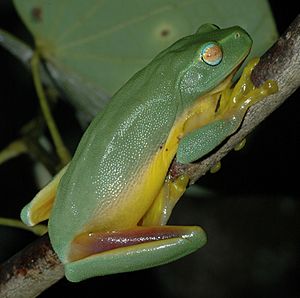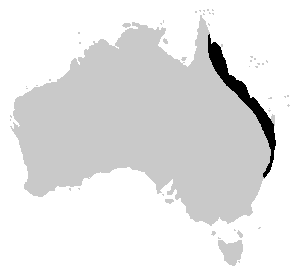Dainty green tree frog facts for kids
The dainty green tree frog, also known as the dainty frog or graceful tree frog (Ranoidea gracilenta), is a small, bright green frog that lives in Australia. You can find these frogs in the eastern parts of Australia, specifically in the states of Queensland and New South Wales.
Quick facts for kids Dainty green tree frog |
|
|---|---|
 |
|
| Conservation status | |
| Scientific classification |
|
| Kingdom: | Animalia |
| Phylum: | Chordata |
| Class: | Amphibia |
| Order: | Anura |
| Clade: | Ranoidea |
| Species: |
R. gracilenta
|
| Binomial name | |
| Ranoidea gracilenta (Spencer, 1896)
|
|
 |
|
| Script error: The function "autoWithCaption" does not exist. | |
| Synonyms | |
|
|
Script error: No such module "Check for conflicting parameters".
What It Looks Like
The dainty green tree frog is quite small. An adult frog usually grows to be about 4.5 centimeters (about 1.8 inches) long. Its skin is a beautiful, bright green color, which helps it blend in with the leaves and plants where it lives.
This frog has striking orange eyes that stand out against its green body. Its feet are yellow, and it also has yellow coloring along its sides. These bright colors make it a very pretty frog to spot! It is related to another frog called Ranoidea chloris.
Where It Lives
Dainty green tree frogs live in different kinds of forests. They especially like places near water, such as swamps, ponds, and slow-moving streams. You might see them sitting on tall reeds or floating plants in the water.
These frogs are also quite adaptable. They can live in areas where people have farms, especially in places where fruit is grown. This shows they can get used to living near humans.
Life Cycle
The life of a dainty green tree frog starts in the water. When the weather is warm, the female frog lays her eggs. She carefully places them on the stems of grass that are growing in the water.
Once the eggs hatch, tiny tadpoles emerge. These tadpoles grow very quickly! It only takes about 14 days for them to change from tadpoles into small frogs. This process is called metamorphosis.
How It Behaves
Dainty green tree frogs change their habits depending on the season. During the warmer months, they stay close to water sources. This is where they find food and where the females lay their eggs.
However, when winter arrives, these frogs move away from the water. They climb up into the tops of trees. Staying high in the trees helps them keep warm and safe during the colder weather.
See also
 In Spanish: Litoria gracilenta para niños
In Spanish: Litoria gracilenta para niños
 | James Van Der Zee |
 | Alma Thomas |
 | Ellis Wilson |
 | Margaret Taylor-Burroughs |


